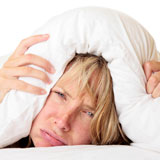Who, me?
Do I have a sleep disorder? Many people ask themselves this question because they have a friend or relative who has undergone diagnostic sleep testing. Do you have a problem and should you see a doctor about your difficulties, too? The fact that you question your sleep quality is probably enough to merit speaking with your physician.
Sleeping is a natural function that your body conducts almost without you having to think about it. It is like eating or breathing; your body will automatically take measures to meet its need for sleep. You will yawn, get tired, and then perhaps micro-nap or dose off. Eventually, if you get the message and lay down, you should go to sleep and awake refreshed and renewed. But, just as you can encounter trouble with any other system in your body, you can likewise develop difficulties in your ability to sleep or in the quality of sleep you receive.
Sleep is important, as it is during sleep that the body repairs itself. Muscle tissue is rebuilt and restored during sleep. Sleep restores the body’s depleted energy reserves and is even a component in the body’s immune system response. Sleep deprivation has long ranging effects on your body as well as on your mental health and your social life. Many people think poor sleep quality and the fatigue associated with it are just problems they have to put up with. These people are needlessly suffering. There is hope and help available.
Self-Help Measures
If you encounter sleep difficulties there are many common sense helps you can try. Many times, simple lifestyle changes will help you overcome sleep issues. Exercise, cutting out caffeine and alcohol, and implementing stress relief techniques can all be useful. Establish a nighttime routine with a consistent bedtime. De-clutter your bedroom so that it is a relaxing environment and use your bedroom only for sleep. Turn off the lights. Be sure you do not have electronic light blazing from an alarm clock or VCR, and that streetlights or other invasive light is not penetrating into your room. Try “white” noise, or some other soothing background sounds. Herbal teas or other supplements may be an aide. Another trick is to take control of your thoughts. Don’t use your pre-sleep time to mull over the problems of the day. Clear you mind and think pleasant relaxing thoughts.
Symptom Checker
If these measures don’t help, it’s time to investigate further. Each sleep disorder has various symptoms. To start, ask yourself the following questions:
- Do you snore loudly, heavily, or even softly while asleep?
- Are you excessively sleepy or do you lack energy in the daytime?
- Do you feel mentally “fuzzy” and have trouble with concentration or memory loss?
- Do you fall asleep while driving, in meetings, while reading a book, or while watching television?
- Do you have occasional morning headaches?
- Do you sleepwalk, have nightmares, or have night terrors?
- Do you suffer from depression or mood changes?
- Do you wake after 7-8 hours of sleep still feeling tired?
- Do you have a creepy crawly sensation in your legs with an irresistible urge to move them, especially when you are at rest?
- Does your bed partner complain about your snoring, movement, or other sleep issues?
- Do you have trouble going to sleep or staying asleep?
- Have you experienced recent weight gain or high blood pressure?
- Have you been told you hold your breath when you sleep?
- Are you too tired to have sex?
- Have your work skills or performance deteriorated? Do you feel not quite as fast or as sharp as you used to be?
- Do you have any decreased coordination?
- Do you kick, jerk, or otherwise thrash about in bed?
- Do you grind your teeth?
- Have you sometimes wake with your heart pounding, or with increased breathing or sweating?
- Are you irritable?
- Do you have blurred or double vision?
- Do you sometimes talk in your sleep?
- Have you ever had a fender bender caused because you had dozed off?
What Could This Be?
There are 70-80 different kinds of sleep disorders. Each has specific symptoms and creates different kinds of problems. The most common sleep disorders are:
Insomnia
It is common to have a few nights of restless sleep, ever so often. Illness or stress can take a toll. However, if you have difficulty falling or staying asleep for a week, you may have insomnia. If this continues a month or more, it is termed “chronic” insomnia. Insomnia may be attributable to a medical, psychiatric or environmental cause. Or, it may be solely a sleep disorder. Your doctor can order polysomnographic testing (sleep testing) to get an accurate diagnosis.
Sleep Apnea
Does your bed mate tell you that you sometimes stop breathing at night? Sleep apnea is a condition that sometimes causes you to choke or gag, but most times you are unaware of it. Apnea is a pause in breathing that may or may not be caused by an obstructed airway. It can last from a few seconds to a minute or longer, and may happen many times an hour. Often, those who suffer from sleep apnea have become accustomed to the daytime sleepiness and fatigue often associated with this disorder. Your doctor has many options for treatment. Be sure to consult a physician if you suspect you may suffer from this condition.
Narcolepsy
Narcolepsy is a disorder marked by a person unwillingly falling asleep at inappropriate times. This is caused by the brain’s inability to control sleep-wake cycles. These sleeping lapses may result in transient micro-naps lasting only a few seconds, or may last several minutes. A person with narcolepsy will experience sudden irresistible bouts of sleep that may occur while at work or at school, when having a conversation, or even while driving an automobile. Many people are afraid to seek help because they feel their driver’s license may be at risk. Most states do not have mandatory reporting requirements. A few, including California, Delaware, New Jersey, Nevada, Oregon, and Pennsylvania, have provisions that require physicians to report drivers who have medical conditions or functional impairments that may affect safe driving ability. A physician must first test to determine the degree to which the condition is affecting a patient’s abilities and the degree to which medication or treatment minimizes the associated risk. Many times a physician does not feel a report is required if a patient is being successfully treated. Discuss this with your physician. Don’t be afraid to seek assistance.
Restless Leg Syndrome
Some people have difficulty sleeping because of an uneasy feeling in their legs. This feeling usually is relieved with movement. The sensation is described as “creepy-crawly” or tingling as if your legs are “about to fall asleep.” The episode may last for an hour or more and often results in some level on insomnia. See your doctor. There are helps available, including medication.
Conclusion
Many people needlessly suffer through the symptoms of sleep disorders. Because these symptoms are not actually painful, they think they are not serious enough to seek help. They stoically continue on, coping as best they can, not wanting to be labeled crazy or hypochondriac. However, more and more people are educating themselves on the topic of sleep disorders. Physicians take complaints of sleep disorder seriously, because they are so disruptive to the patient’s quality of life.
If you have any symptoms of a sleep disorder, you should discuss them with your physician. A doctor can order sleep testing that can give you an accurate diagnosis. There are many options available to help you manage this disorder and feel better.

